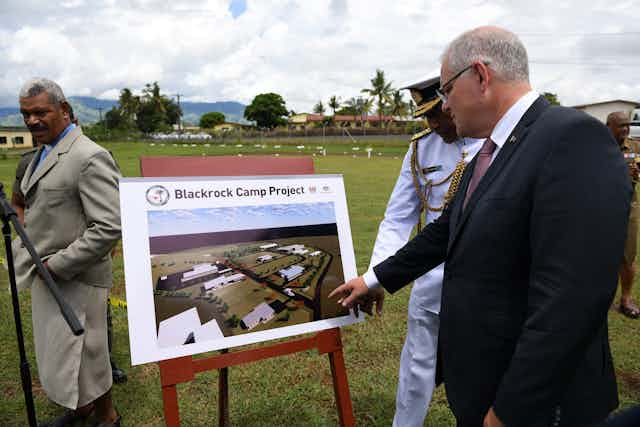January is an odd time for high level visits to the Pacific. But Prime Minister Scott Morrison’s decision to focus on the region at the start of the year indicates he listened to the criticism of his failure to attend the Pacific Islands Forum meeting in Nauru last September.
This visit began and ended with security. The Vanuatu leg of the trip provided a clear illustration that, when it comes to security, what Canberra understands (and wants) does not necessarily line up with the needs of Pacific island countries.
Vanuatu and security
Vanuatu is seeking support for domestic security issues, such as increasing its police force. This is more of a priority than a security treaty with Australia, as Canberra had proposed during the Vanuatu prime minister’s 2018 visit to Australia - it was rejected at the time. Ahead of Morrison’s visit, Vanuatu’s foreign minister, Ralph Reganvanu, reiterated there was no appetite in his government to enter into an exclusive security agreement with any country.
Vanuatu’s longstanding membership of the Non-Aligned Movement (formed during the Cold War by states who did not wish to be aligned with either of the then superpowers) is part of what informs this position.
Something like the Australia-Solomon Islands security treaty – which envisages rapid deployment of Australian troops (subject to consent by both governments) – would be highly problematic for most people in Vanuatu, a country that places high value on its hard-won independence and sovereignty.
Read more: Morrison's Vanuatu trip shows the government's continued focus on militarising the Pacific
Fiji and a thawing of relations
The visit to Fiji was particularly significant given strained relationships between the two governments since the 2006 coup. Some in Australia’s foreign policy community believe the freeze pushed Fiji’s Prime Minister, Frank Bainimarama, to build relationships with China, Russia, and others to the detriment of Canberra in terms of influence.
That’s why securing the Black Rock redevelopment deal last year – a site that’s to become a regional hub for training of defence and security personnel – is a success for Australia. Having Morrison there to break ground on the project may indicate all is now forgiven on both sides.
However, a visit by the leader of the region’s largest democracy and the apparent credibility it gives to Bainimarama’s government will be a disappointment to those who have ongoing concerns about human rights and democratic governance in Fiji.
The Fiji trip unveiled a Fiji-Australia Vuvale Partnership, touted as elevating the relationship beyond diplomacy. The agreement includes a commitment to annual leaders’ meetings, something that already exists between Australia and Papua New Guinea. Other than that, we have yet to see what it will look like in practice.
Read more: Fiji coup leader gets the democratic approval he wanted
Further to last year’s announcement of the creation of an Office of the Pacific in the Department of Foreign Affairs and Trade (DFAT), Morrison used this trip to announce Ewen McDonald (currently Australia’s High Commissioner to New Zealand) as its head.
McDonald will work on ensuring Australia’s engagement with the Pacific informs the work of all relevant government departments. This will include Fiji’s joining the Pacific Labour Scheme and steering the revisions of import restrictions on kava that were announced in Port Vila. Currently, the maximum amount of kava that can be brought in to Australia is 2kg per adult due to concerns about substance abuse in Australian Indigenous communities.
Broader region
What was said (and just as importantly what wasn’t) during this week’s visit to the region indicates Australia needs to do more listening and learning. For too long, people in the Pacific have felt their voices have not been heard when it comes to how Australia engages in the region.
In Vanuatu, Morrision demonstrated particular tone-deafness on the issue of ease of travel. Across the region, people are frustrated about the difficulties they face in getting visas to visit Australia.
The Australian government announced a frequent traveller visa card on the margins of last year’s APEC summit. This is intended for politicians, sports people and business leaders. But its narrow scope doesn’t cut it as far as people in Vanuatu are concerned. Officials transiting to attend international meetings or families visiting students at Australian universities, for instance, aren’t included.
Morrison also isn’t listening when it comes to Australian broadcasting to the Pacific. He announced A$17.1 million dollars to fund TV content for broadcast to and in the region. This money is to be funnelled to commercial providers via Free TV Australia, snubbing the established Pacific expertise of the ABC and SBS/NITV. Not to mention their reputation in the region.
This ignores specific representations from the Pacific which have stressed time and again what they want is high quality content to raise the level of public debate about the issues they care about.
Scott Morrison did “show up” though, as he had planned. It’s a first step. Whether Australia-Pacific relationships are now on the right path, we have yet to see.

